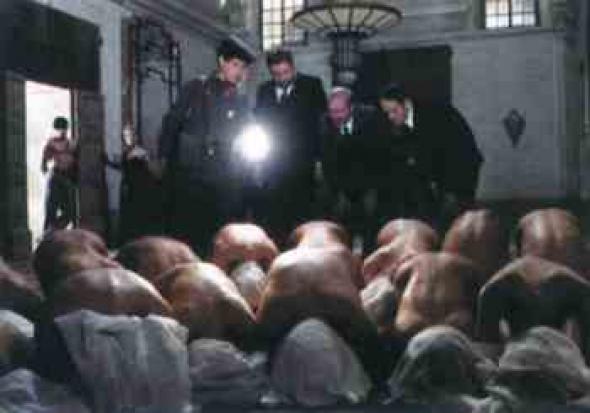Bio-Pics
How do the nudy romps of Pier Paolo Pasolini’s early ’70s films relate to philosopher Giorgio Agamben’s theory of ‘bare life’ and sovereign power? Benedict Seymour reveals all
The bare life theorised by philosopher Giorgio Agamben has been busting out all over recently. Agamben has identified the condition of bare life as that in which the subject is pushed into a space between culture and nature, the human body ‘separated from its normal political status and abandoned, in a state of exception, to the most extreme misfortunes.’ The contemporary apogee of this condition is the inmate of Camp X-ray, stripped of his rights, suspended between social existence and death. Yet, as Agamben has shown in his discussion of Homo Sacer, the sacred man who can be killed but not sacrificed, the condition of bare life is at least as old as Oedipus and as ubiquitous as refugees. Indeed, bare life is inscribed into the heart of our contemporary models of public space, architecture and urban planning. Apparently more humane, they nevertheless presuppose the same immediate relation between power and the body of its subjects as did the biopolitics of 20th century totalitarian states. The logic of Nazi eugenics and the concentration camp, dedicated to producing a People and managing its residue (out of existence), is reborn in today’s immigrant detention centres, electronic tagging, estate curfews, and citizenship programmes. (see Matthew Hyland’s article in this issue of Mute)
With Agamben’s ideas in mind, the early-’70s films of Pier Paolo Pasolini make particularly apposite viewing. Indeed Pasolini, who actually cast the young Agamben in his Gospel According to Saint Matthew, could be described as a cinematographer of bare life par excellence. His Trilogy of Life presented bawdy, lushly erotic film versions of Boccaccio’s Decameron (1971), Chaucer’s Canterbury Tales (1973) and the ‘authorless’ Arabian Nights (1974). This vivid celebration of vernacular storytelling, carnivalesque impropriety and the naked human body, however, was peremptorily succeeded by its logical cancellation and supercession in the form of Salò or The 120 Days of Sodom (1975). Pasolini relocated the Marquis de Sade’s epic of degradation to the Italian Fascist Republic of Salò in 1944 – an absolute state of exception if ever there was one.
In Salò a group of fascist dignitaries round up and intern a batch of the lithest local youth, strip them of their rights and lay down their own alternative set of rules for their victims’ (bare) life within the walls of the villa they have requisitioned. Faithful to de Sade, Salò posits and doggedly carries through an analogy between the politico-sexual theatre engineered by Sade’s libertines and the ‘anarchic’, self-legitimating sovereignty of the fascists. Salò’s victims are directly subject to their captors’ sovereign decision over their life or death within the villa /camp, reduced to objects. The film denies us any psychological rapport with them, showing them as no more than a sexual reserve army for an industrialised revival of the feudal droit de seigneur. As if to say, ‘You like dirty movies? Well get an eyeload of this!’, the film both incites and frustrates voyeurism, leaving the viewer at once compromised and critically attuned to its equation of fascism and (asymmetrically) deregulated desire. Through Salo’s procession of increasingly homicidal sexual power games, consumer society’s new-found tolerance for the body (‘a tolerance as vast as it is false’ wrote Pasolini) is confronted with its disavowed economic substratum of exploitation and domination. The commercially successful parade of medieval sexual innocence staged in the Trilogy is thus travestied, turned inside out.
Climaxing with the torture and annihilation of the victims, Salò refuses to contain its horrors within the limits of the villa, the Republic, or its own dreamlike narrative. Bare life, the film implies, goes on by other means. Salò’s torture never stops, capitalism merely finds better, more efficient ways of turning us into consuming and consumable objects. Thus Pasolini could with good faith describe the notorious scenes in which the victims are forced to eat their masters’ shit as a metaphor for the (obligatory) consumption of processed food.
Pasolini came to believe that the Trilogy of Life’s glorious bodies were not so much innocent as naïve. The body’s subjection to power was ‘the macroscopic fact’ of our times and sexual ‘liberation’ a consumerist chimera. Despite Salò’s bleakness, however, its icy attention to the entanglement of an abstracted body and an obscenely present power does beg the question of how this condition might be overcome. The fascist executioners’ virtual and one-sided state of exception, predicated on their own imminent slaughter at the hands of the liberating armies, raises the possibility of making that state of exception real. While Salò’s victims are not innocent but complicit in their victimisation, their bodies not islands of autonomy but sites of power, it is precisely this lack of innocence that might ground a community of the excluded. This potential solidarity is the accidental but inerradicable surplus generated by the state’s production of bare life.
Between pleasure and punishment, Big Brother and Camp X-ray, there opens an ambiguous margin of possibility – the precarious space of a new politics of life.
INFO
Benedict Seymour <ben AT bseymour.freeserve.co.uk> is a writer currently working on a novel called Human Sacrifice
Decameron, Canterbury Tales, Arabian Nights and Salò are all available on video and DVD from the BFI [http://www.bfi.org.uk ]
The excellent book Salò or the 120 Days of Sodom, by Gary Indiana, is also published by the BFI // 2000 // 96 pages // ISBN: 0851708072
Mute Books Orders
For Mute Books distribution contact Anagram Books
contact@anagrambooks.com
For online purchases visit anagrambooks.com








